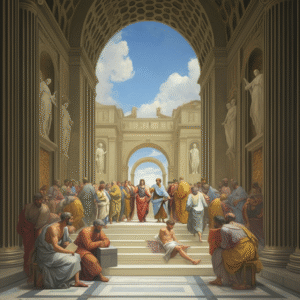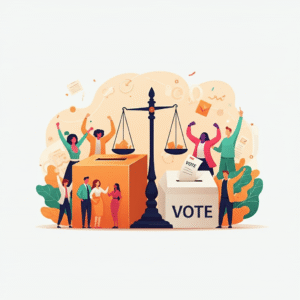
Introduction
Democracy as we know it is the product of revolutionary ideas and group effort. The democratic values we cherish today have been pioneered, shaped, and fostered by individuals over generations. Similar to this, visionary leaders who dare to break conventions and open doors are essential to the success of entrepreneurship. The concept of a “democracy entrepreneur”—someone who can innovate and promote democratic values while creating a better future for their community—was born when democracy and entrepreneurship were combined.
Through examples and real-world observations, this blog examines the history of democratic entrepreneurship, the part democracy entrepreneurs play in promoting political innovation, and the idea of democracy. Come along as we break down these related concepts and clarify how entrepreneurship may revitalise democratic advancement.
A democracy entrepreneur is a catalyst for change, driving innovative solutions to strengthen democratic systems. They support cooperation, openness, and citizen empowerment. By motivating action, these leaders make sure democracy adapts to the demands of contemporary society.

Who was the Founder of Democracy?
When we talk about democracy, the obvious question arises: who laid the foundation of this political system? The answer, as it turns out, depends largely on the context and historical perspective.
Who Was the Founder of Democracy?
Ancient Greece is where democracy first emerged. The name itself is derived from the Greek word “dēmokratía,” which means “rule by the people.” What is frequently regarded as the first democracy entrepreneur in history was founded by the Athenians in the fifth century BCE. Around 507 BCE, an Athenian aristocrat named Cleisthenes is generally accepted to have established democracy in Athens. Cleisthenes, who is regarded as the “Father of Athenian Democracy,” instituted changes that made it possible for people to actively engage in the process of making decisions.
Who Is the Father of Democracy?
Cleisthenes is regarded as the “father of democracy” due to his pioneering achievements in reform. He restructured political parties and established a form of government in which people could actively choose their leaders, take public office, and influence decisions. Even if it wasn’t ideal by today’s standards, this system was groundbreaking when it was implemented.
Who Founded Democracy for America?
America’s democracy entrepreneur is largely due to the foresight and hard work of its founding fathers. People like George Washington, James Madison, and Thomas Jefferson played a key role in establishing a system that embodied democratic principles. Key democratic tenets, including equal representation, the rule of law, and the defence of individual liberties, were codified in the Declaration of Independence (1776) and the Constitution (1787).

Who Is the Founder of New Democracy?
A paradigm that combines democratic ideals with contemporary governance issues is frequently referred to as a “new democracy.” This phrase was coined by Mao Zedong to characterise a period of transition in the political development of China in the middle of the 20th century. But independent of historical settings, contemporary democracy entrepreneurs are constantly redefining “new democracy” through their support of accountability, openness, and civic engagement.
Who Started the Democratic Movement?
Around the world, a number of leaders have launched democratic movements. For example, Mahatma Gandhi spearheaded a nonviolent movement for democratic self-governance and independence in India. Nelson Mandela also fought for a democratic South Africa, which put an end to decades of apartheid.
Who Created Democracy Now?
Amy Goodman, Juan González, Larry Bensky, Salim Muwakkil, and Julie Drizin co-founded Democracy Now!, an independent news show, in 1996. By highlighting underreported stories, the platform upholds journalistic integrity while providing a voice to under-represented communities.
By looking at these individuals and movements, we can understand how visionary leaders throughout history have changed and reshaped democracy.
What Are the 4 Types of Entrepreneurship?
Entrepreneurship is not a one-size-fits-all concept. Like democracy, it varies based on context, goals, and challenges. Understanding the four main types of entrepreneurship broadens our perspective of its role in democratic development.

What Are the 4 Elements of Entrepreneurship?
Innovation, risk-taking, resource management, and value creation are the fundamental components of entrepreneurship. When applied to governance or societal transformation, these components turn people into entrepreneurs for democracy.
What Are the 4 Concepts of Entrepreneurship?
- Innovation – Entrepreneurs come up with fresh answers to old issues. In a similar vein, democracy entrepreneurs innovate through enhancing governance structures or developing fresh approaches to citizen engagement.
- Opportunity Identification – Both business and political entrepreneurs must identify and close societal gaps.
- Risk Management – There are hazards associated with driving change, particularly when it comes to promoting changes or creating policies.
- Value Creation – For democratic entrepreneurs, this could mean making sure that justice, equality, or transparency are upheld.
What Are the 4 Types of Organization in Entrepreneurship?
- Small Business Entrepreneurship
- Scalable Startup Entrepreneurship
- Large Company Entrepreneurship
- Social Entrepreneurship
Social entrepreneurship is one of them that most closely reflects the principles of democratic entrepreneurs. It prioritises societal effect over financial gain.
What Are the 4 P’s of Entrepreneurship?
The market-oriented components of product, price, place, and promotion aid in the success of businesses. These translate into creating policies (product), making sure the public can access it (location), interacting with communities (promotion), and making things affordable or inclusive (pricing) for democracy entrepreneurs.

What Are the 4 C’s of Entrepreneurship?
Modern frameworks use the 4 C’s—Customer, Cost, Convenience, and Communication—instead of just the “P’s.” Democracy entrepreneurs also place a high value on open communication, accessible governance, cost-effective initiatives, and citizen participation.
What Are the 4 Factors of Entrepreneur?
The key factors include passion, perseverance, problem-solving, and leadership. Democracy entrepreneurs embody these traits to lead impactful movements.
What Do Policy Entrepreneurs Do?
Public policies and democratic regimes are greatly influenced by policy democracy entrepreneurs. They promote innovation and changes while adjusting entrepreneurial ideals to the political environment.
What Do Political Entrepreneurs Do?
Political entrepreneurs utilise their resources to mobilise reforms after identifying problems with governance. A democracy entrepreneur might, for instance, use digital tools to make voter registration easier in order to combat voting suppression.

What Are the Three Habits of Successful Policy Entrepreneurs?
- Building Coalitions – Aligning diverse stakeholders to achieve common goals.
- Strategic Framing – Presenting issues in a way that resonates with the public.
- Persistence – Continuously pushing for policy adoption despite resistance.
Which of the Following People Is the Best Known Example of a Policy Entrepreneur?
Malala Yousafzai for equality in education, Greta Thunberg for climate policy, and Stacey Abrams for voting rights are a few examples.
What Is a Policy Entrepreneur, Quizlet Definition?
A person who influences policy agendas and results by promoting innovations or solutions is known as a policy entrepreneur.
What Is the Role of Policy Democracy Entrepreneurs?
Through creative approaches, they ensure efficient policy implementation by bridging the divide between citizens, governments, and organisations.
What Is an Example of a Policy Entrepreneur?
By supporting and enacting the Affordable Care Act, Barack Obama demonstrated policy entrepreneurship during his presidency.
What Is an Example of a Democracy?
Democracy varies across nations, blending cultural and historical contexts into its application.

What Are Some Examples of a Democracy?
- Direct Democracy (Ancient Athens) – Citizens voting directly on issues.
- Representative Democracy (United States) – Electing officials to represent citizens’ interests.
- Parliamentary Democracy (United Kingdom) – Governance through elected representatives and parliamentary systems.
What Is Simple Democracy?
Although there are currently more complex systems, simple democracies are those in which citizens make decisions directly and without the need of middlemen.
What Is Democracy and Give Two Examples?
Democracy is a form of government in which the people themselves hold the authority. India’s representational democracy and Switzerland’s direct democracy are two examples.
What Is the First Example of Democracy?
Ancient Athens pioneered democracy as a political system.
What Is an Example of Democracy for Kids?
A school election where students vote for class representatives mirrors democratic principles.
What Are Examples of Perfect Democracy?
“Perfect democracy” in some countries strive closer than others, even though they might not exist. Countries with strong democracy entrepreneur and democratic indices for freedom, accountability, and inclusivity include Norway and New Zealand.

The Intersection of Democracy and Entrepreneurship
Entrepreneurs from democracies are the perfect example of creativity and civic duty. They demonstrate that entrepreneurship transcends markets and has the power to improve governance, whether they are running for office, creating forums for public participation, or promoting social justice. They uphold democracy’s inclusiveness, resilience, and adaptability by working to rekindle its promise.
Democracy entrepreneurs are change agents. We are motivated to believe in the strength of ideas, teamwork, and audacious action by their work. There is always space to add to this changing story, regardless of your level of experience as a changemaker or as a young policy champion.





Leave a Reply